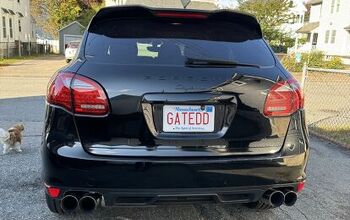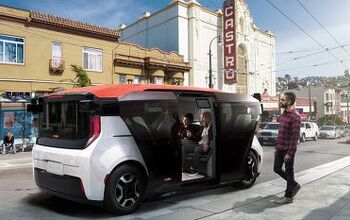Study: Global Recession Negatively Impacting EV Sales (Duh)

Today’s study comes straight from the memoirs of Captain Obvious. Apparently, an economic recession isn’t what you want when you’re vying to sell factory fresh automobiles beyond the confines of rock-bottom prices. There might even be a correlation between being broke and lacking the ability to purchase items in general. At least, that was the takeaway from a cutting-edge assessment recently conducted by Auto Trader in the United Kingdom.
In an attempt to keep tabs on the public’s level of interest in reference to electric vehicles, the outlet has been surveying people at semi-regular intervals. Back in January, it asked 2,300 consumers ‘waddya buying,’ only to learn that 17 percent had their hearts set on a battery electric vehicle. That’s impressive considering less than 10 percent of automobiles in the UK utilize electricity for propulsion and most of those happen to be hybrid models. But the trend toward BEVs has shifted rather dramatically since the COVID pandemic took hold.
A follow-up questionnaire from August (this time with 2,700 respondents) shows demand has waned immensely. Only 4 percent of respondents said they were planning on getting themselves a battery electric vehicle.
While the obvious explanation has everything to with the financial fallout stemming from pandemic-related lockdowns, some amount of faith seems to have been shaken in the usefulness of EVs specifically. People are going to be less likely to purchase a new vehicle as the economic situation worsens, but electrics seem to be taking a larger hit.
“At a time of economic uncertainty car buyers are reverting to the type of vehicles they are more familiar with, and what they consider to be the most affordable choice, namely petrol and diesel cars,” The Financial Times’ quoted Ian Plummer, Auto Trader’s commercial director, as saying. “Since cost is the primary consideration for most car buyers, the upfront retail price of EVs [electric vehicles] is somewhat off-putting.”
The prevailing assumption among “experts” is that electric vehicles are easier on the pocketbook on a longer timeline, making it look as though these customers are playing themselves. But we’re inclined to believe it’s more complicated than that. While EVs are cheaper to run (so long as electricity remains more affordable than gasoline), they’re usually priced several thousand dollars higher than their internal-combustion equivalents. Initial maintenance costs are also significantly lower (depending on your warranty) on EVs, but swapping in a new battery much further down the line will be an extremely expensive item. Then we have depreciation, which currently has electrics losing their value at higher rates — though this is frequently offset by environmental subsidies designed to spur adoption rates.
All told, that makes it seem as if consumers aren’t just factoring “familiarity” into their purchasing decisions. They know that electric affordability is highly conditional. Combine that with EVs being slightly less practical when utilized as a household’s only vehicle and it’s not surprising they’d second guess themselves in a time of crisis.
However, the survey seems to indicate the biggest issue isn’t looking at the big picture, but the upfront cost of buying an electric car. Nearly half of the respondents opting against an EV in August said their personal finances wouldn’t allow for the initial expense. One-fifth claimed they were simply concerned with spending money while the economy looked so sickly.
The Society of Motor Manufacturers and Traders has reported that electric vehicle sales have continued to rise through 2020, though. FT cited the organization as confirming 40,000 new EV sales in the UK between January and July versus roughly 14,000 sales in the same period from 2019. Unfortunately, deprecation has accelerated, with used models seeing prices drop by 5.2 percent in August.
“Over the past year, consumer demand has outweighed supply,” Plummer explained. “However, since the emergence of COVID-19, we have seen this trend reverse; whilst supply levels have remained relatively constant, consumer demand has eased, which has been a contributing factor to over six months of consecutive year-on-year price decline for hybrid and electric cars.”
Meanwhile, the pandemic has caused general vehicle pricing to spike in North America. Following production stoppages and a total lack of demand from earlier in the year, the automotive industry claims it’s struggling to meet demand as supply chains normalize. People are also shunning public transportation in large numbers, fearful that they may be infected by the Wuhan Wheeze, La Rona, The Coof, etc. — which is also believed to be ramping up demand unexpectedly.
[Image: nrqemi/Shutterstock]

A staunch consumer advocate tracking industry trends and regulation. Before joining TTAC, Matt spent a decade working for marketing and research firms based in NYC. Clients included several of the world’s largest automakers, global tire brands, and aftermarket part suppliers. Dissatisfied with the corporate world and resentful of having to wear suits everyday, he pivoted to writing about cars. Since then, that man has become an ardent supporter of the right-to-repair movement, been interviewed on the auto industry by national radio broadcasts, driven more rental cars than anyone ever should, participated in amateur rallying events, and received the requisite minimum training as sanctioned by the SCCA. Handy with a wrench, Matt grew up surrounded by Detroit auto workers and managed to get a pizza delivery job before he was legally eligible. He later found himself driving box trucks through Manhattan, guaranteeing future sympathy for actual truckers. He continues to conduct research pertaining to the automotive sector as an independent contractor and has since moved back to his native Michigan, closer to where the cars are born. A contrarian, Matt claims to prefer understeer — stating that front and all-wheel drive vehicles cater best to his driving style.
More by Matt Posky
Latest Car Reviews
Read moreLatest Product Reviews
Read moreRecent Comments
- Theflyersfan OK, I'm going to stretch the words "positive change" to the breaking point here, but there might be some positive change going on with the beaver grille here. This picture was at Car and Driver. You'll notice that the grille now dives into a larger lower air intake instead of really standing out in a sea of plastic. In darker colors like this blue, it somewhat conceals the absolute obscene amount of real estate this unneeded monstrosity of a failed styling attempt takes up. The Euro front plate might be hiding some sins as well. You be the judge.
- Theflyersfan I know given the body style they'll sell dozens, but for those of us who grew up wanting a nice Prelude Si with 4WS but our student budgets said no way, it'd be interesting to see if Honda can persuade GenX-ers to open their wallets for one. Civic Type-R powertrain in a coupe body style? Mild hybrid if they have to? The holy grail will still be if Honda gives the ultimate middle finger towards all things EV and hybrid, hides a few engineers in the basement away from spy cameras and leaks, comes up with a limited run of 9,000 rpm engines and gives us the last gasp of the S2000 once again. A send off to remind us of when once they screamed before everything sounds like a whirring appliance.
- Jeff Nice concept car. One can only dream.
- Funky D The problem is not exclusively the cost of the vehicle. The problem is that there are too few use cases for BEVs that couldn't be done by a plug-in hybrid, with the latter having the ability to do long-range trips without requiring lengthy recharging and being better able to function in really cold climates.In our particular case, a plug-in hybrid would run in all electric mode for the vast majority of the miles we would drive on a regular basis. It would also charge faster and the battery replacement should be less expensive than its BEV counterpart.So the answer for me is a polite, but firm NO.
- 3SpeedAutomatic 2012 Ford Escape V6 FWD at 147k miles:Just went thru a heavy maintenance cycle: full brake job with rotors and drums, replace top & bottom radiator hoses, radiator flush, transmission flush, replace valve cover gaskets (still leaks oil, but not as bad as before), & fan belt. Also, #4 fuel injector locked up. About $4.5k spread over 19 months. Sole means of transportation, so don't mind spending the money for reliability. Was going to replace prior to the above maintenance cycle, but COVID screwed up the market ( $4k markup over sticker including $400 for nitrogen in the tires), so bit the bullet. Now serious about replacing, but waiting for used and/or new car prices to fall a bit more. Have my eye on a particular SUV. Last I checked, had a $2.5k discount with great interest rate (better than my CU) for financing. Will keep on driving Escape as long as A/C works. 🚗🚗🚗


































Comments
Join the conversation
For those who believe that EVs and in particular Teslas are purchased because they are green, please re-evaluate. Teslas are purchased for their status/perceived prestige. Their performance is a side benefit. From an article printed today by the company that owns this site: 'Speaking of Tesla, this year, the car has taken over Muskoka. So, I heard from more than one close car-watcher. Where, last year, there were only a couple to be seen, it is now the car of choice for those who might still have a $290,000 Tige Wakeboard .... Everywhere from Bush’s Watersports Park to the local plumbing store, you will see Tesla-dedicated chargers for those sneaking up in electrical silence. A big Bloomberg story that announced that Muskoka was now the world’s second-fastest growing recreational real estate market after Côte d’Azur, France.'
FYI this has the hallmarks of an industry hit piece. A type of commercial propaganda. It has been circulated and re-printed widely. It misrepresents the study and suggests the opposite of what Q1 and Q2 2020 sales data shows. Sadly, not "by Matt Posky," but no hard feelings - monetizing of content and all that. I haven't found yet who did write it.